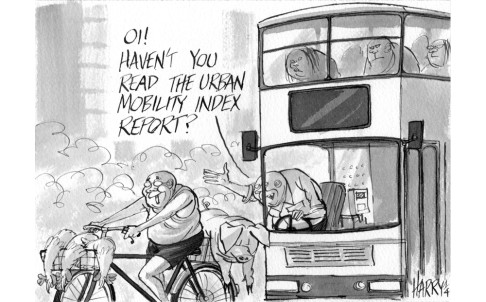
Hong Kong named ‘best city in the world for commuters’
Public transportation gets top marks in survey but cycling and air quality still a problem
Hong Kong is the best place in the world for people to travel around, but falls behind in cycling paths and air quality, a study has found.
The study, involving 84 major cities across the globe, found the city had developed “the most advanced urban mobility system in the world”, with public transport being the main mode of commuting and the number of registered vehicles per head of population is one of the lowest.
Hong Kong, which also topped the list in the last survey in 2011, scored 58.2 out of 100 this year, followed by Stockholm with 54.7, Amsterdam third and Copenhagen fourth. Singapore is in sixth place, after Vienna.
London ranked ninth in the study, with Tokyo 19th and Beijing 28th, followed by Guangzhou.
The Urban Mobility Index report, compiled by international consultancy company Arthur D Little, found Hong Kong’s railway system “impressive”, and the high use of Octopus cards also played an important part in securing the top spot. “MTR has turned Hong Kong’s high population density into an opportunity rather than a threat,” it said.
Watch: Hong Kong's MTR during peak hours
It described the city as “a striking example of a city entering into a virtuous system”, but it noted that its mobility had been shaped by “one dominant operator” – the railway.
“Further improvement of the mobility system will require more co-operation with other stakeholders in the ecosystem and the introduction of innovative mobility services”.
Further improvement of the mobility system will require more co-operation with other stakeholders in the ecosystem and the introduction of innovative mobility services
Although the city fares well in most indicators of the study, its score in cycle path density was the lowest in the top 11 cities. Hong Kong only has 187 kilometres of cycling paths for every 1000 square kilometres of land, compared to 4,041 in Stockholm, 3,502 in Amsterdam and 280 in Singapore.
The city also did not do well in the air quality indicators. The annual average transport-related emission of nitrogen dioxide stood at 50mcg per cubic metre, and there was 50mcg per cubic metre of particulate PM10.
Government figures show the roadside nitrogen dioxide level has increased by a quarter since 2006.
Hong Kong Cycling Alliance chairman Martin Turner said Hong Kong had great potential to become a bicycle-friendly city because of the compact urban area, and the government should stop treating cycling only as a leisure activity.
He welcomed the government’s initiatives to improve and build cycling tracks in the New Territories but said more effort would be needed to extend the network to other areas.
“We shouldn’t use [the high ranking of Hong Kong] as a reason for the absence of cycling.”
Friends of the Earth’s Melonie Chau Yuet-cheung said poor air quality score could be attributed to the bad planning in Hong Kong, with buildings creating a wall effect. The many traffic lights also made cars stop and go frequently, generating exhaust fumes.
She said the government should considering road charging in the busiest parts of the city or banning cars from entering certain districts.
The study said 38 per cent of Hongkongers used zero emission modes of transport – cycling and walking. The organisation noted that it was much higher than the general public perceived.
The Transport Department said it strived to promote bicycle-friendly environment in rural areas, new towns and new development areas and was carrying out a comprehensive review of the city’s cycling policy.
The Environmental Protection Department said it was pleased with the survey. It had taken measures to reduce roadside pollution by phasing out some 82,000 pre-Euro IV diesel commercial vehicles, subsidising franchised bus companies to test hybrid and electric buses, and other schemes to control emissions. It would also work with Guangdong authorities to reduce emission in the region, it said.

